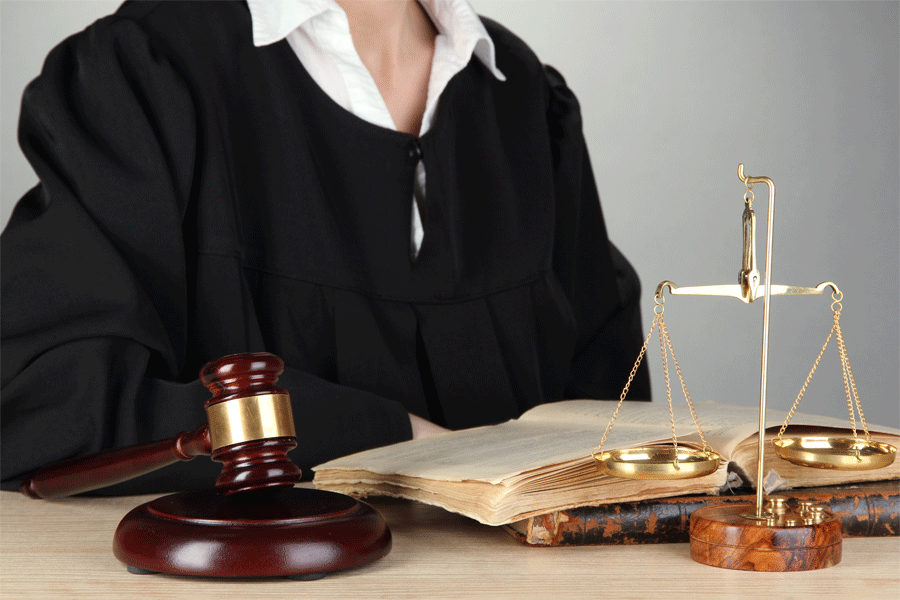A character referee can be helpful not only to the court but also to the defendant. The referee can provide information about the defendant that would otherwise be dismissed or not considered during a court hearing. Information provided by the referee helps ensure that the court gets a glimpse of who the defendant is rather than just the crime that has been committed. A character witness letter is a tool that can be used to communicate these details.
A well-written letter allows the court to see things from the perspective of someone who knows the defendant well. Such a view can impact how the court moves forward with sentencing. This begs the question, What is a character witness letter? What is its purpose? And how should it be written? This article explores these details to ensure that both the defendant and the referee can fully utilize the letter during court proceedings.
Templates and Examples
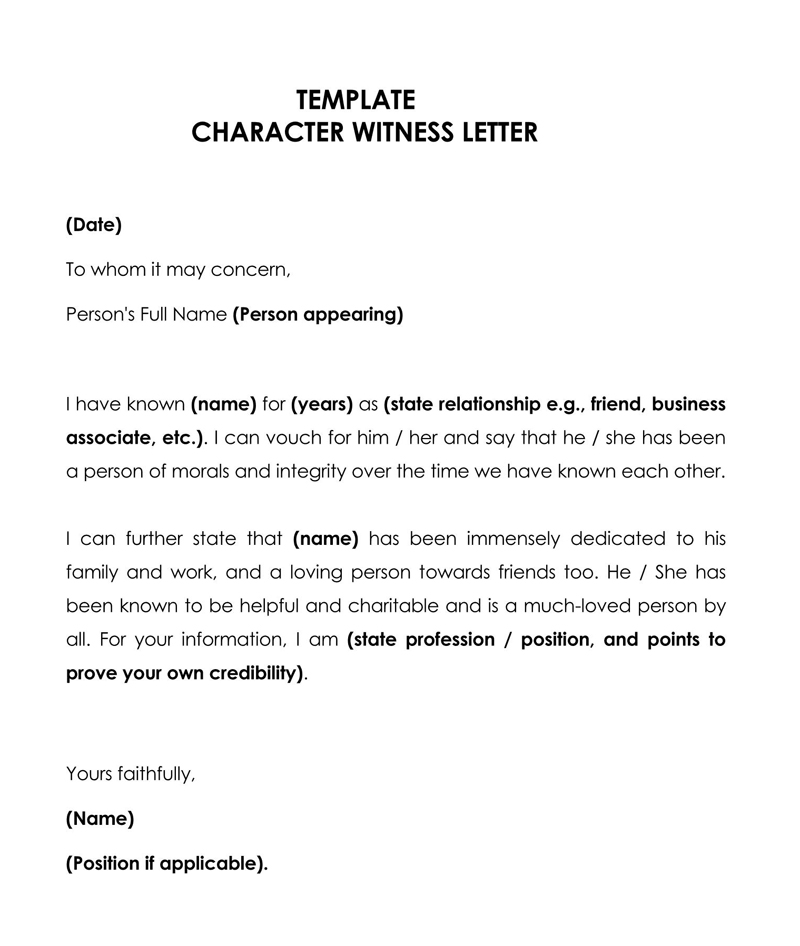
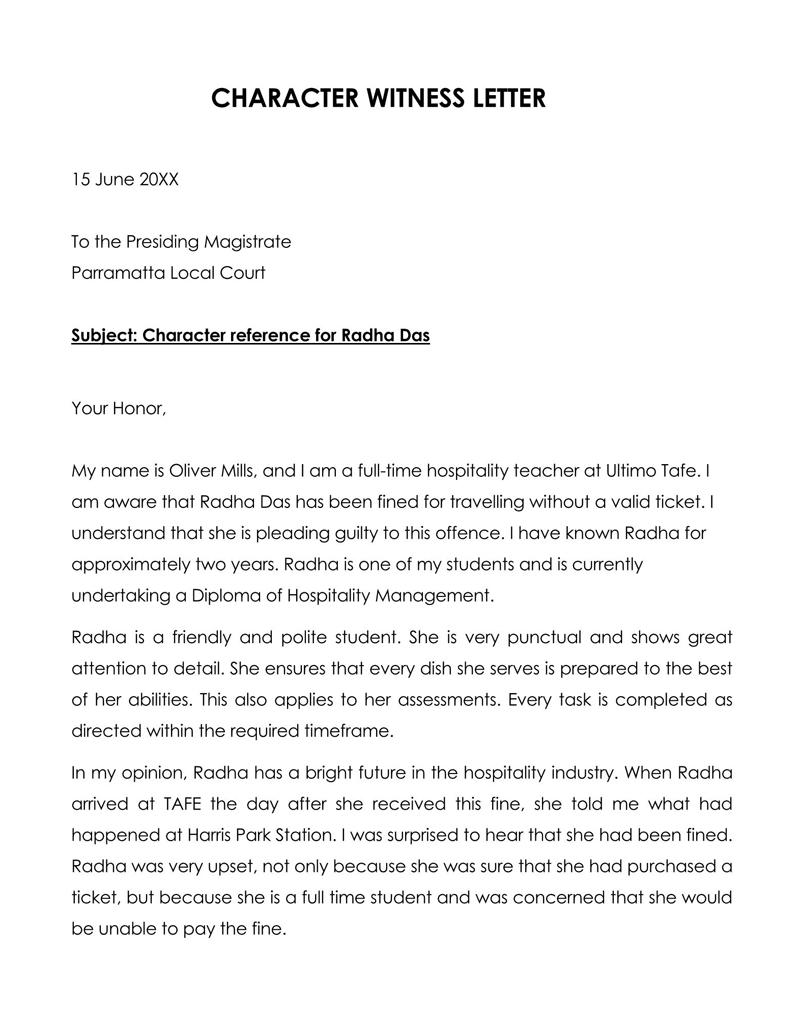

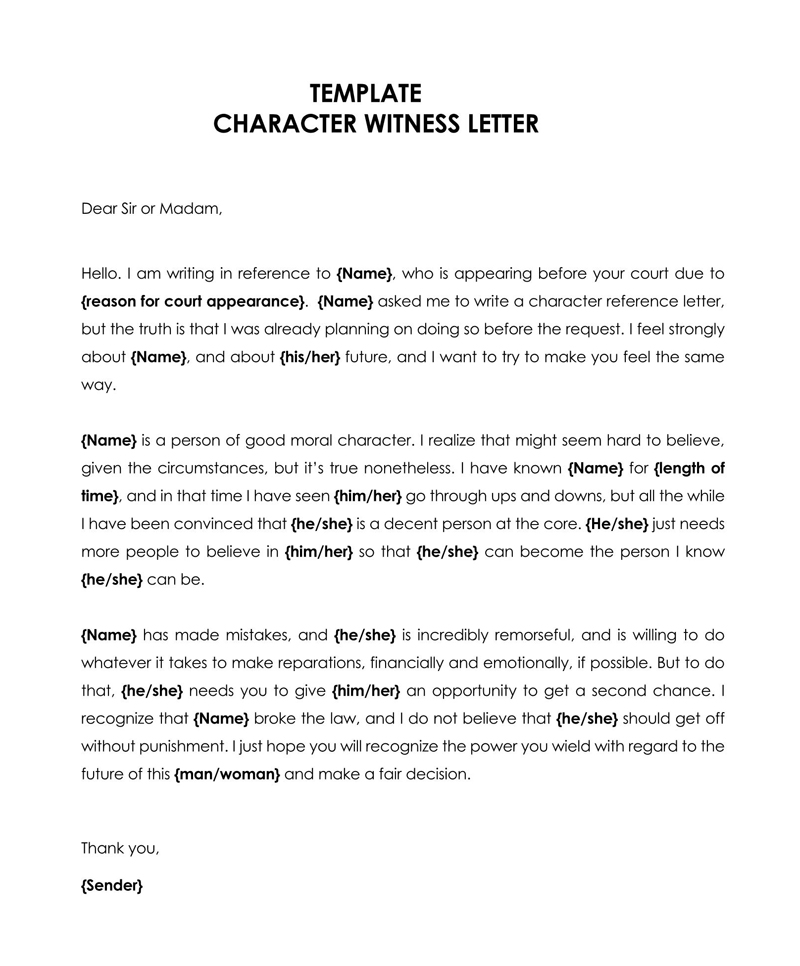
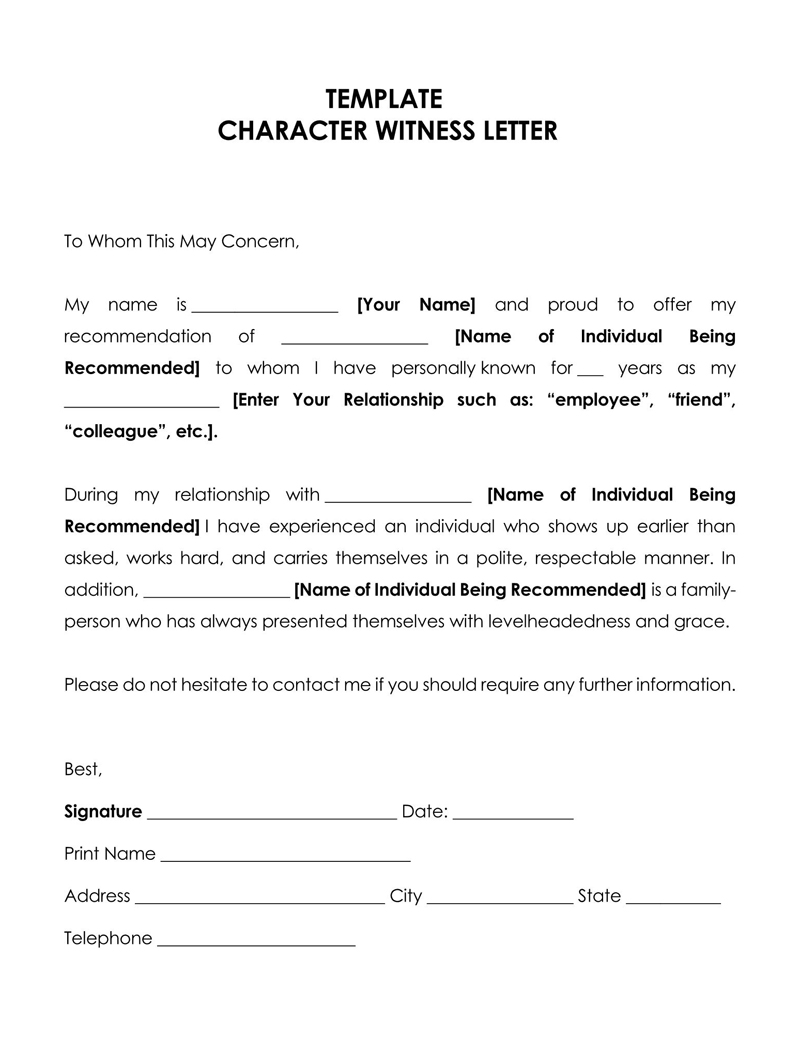
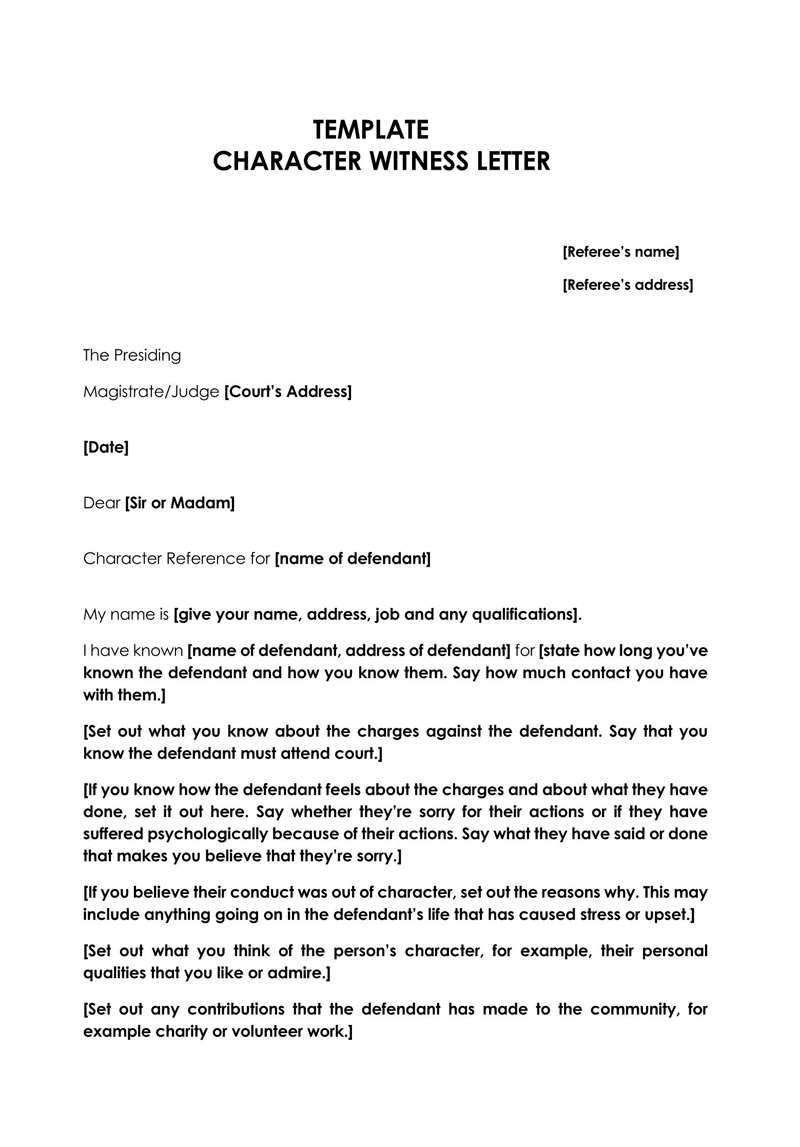
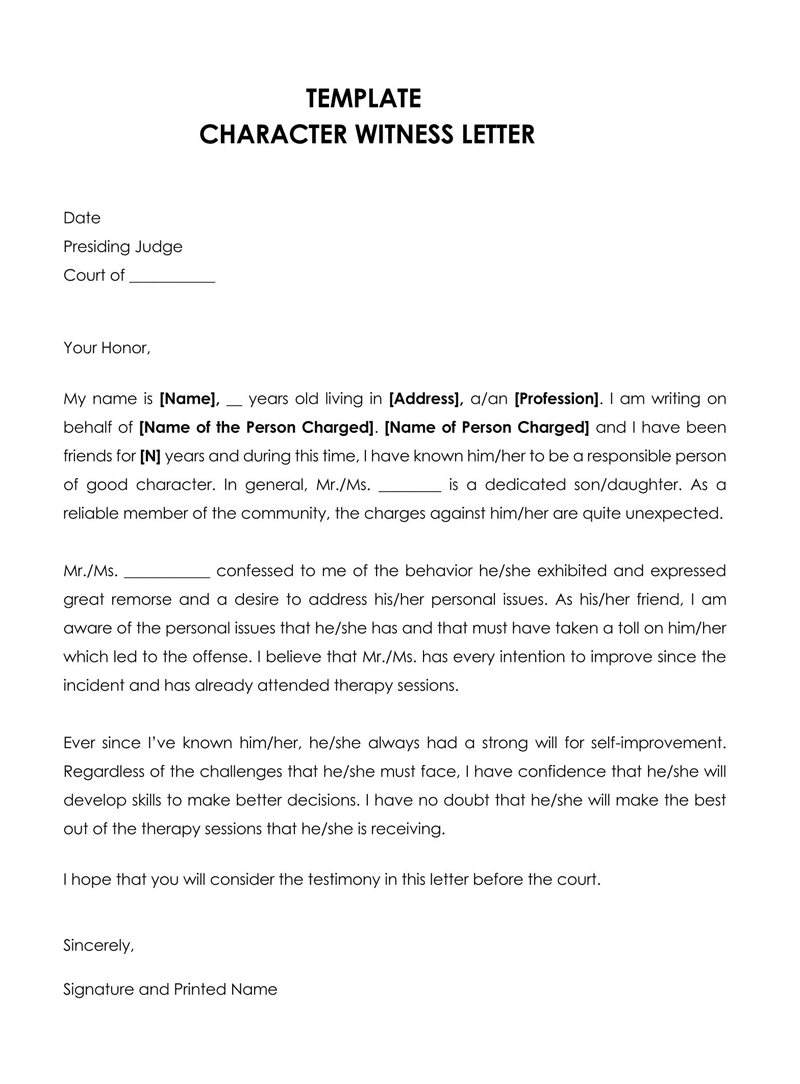
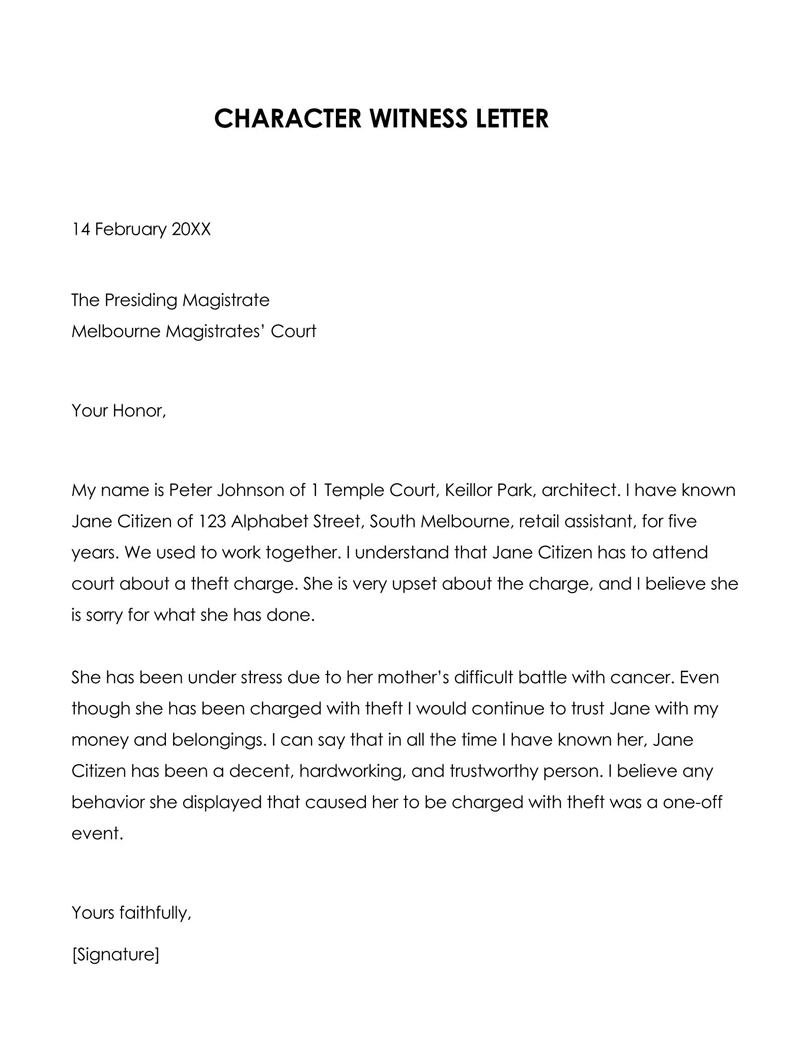
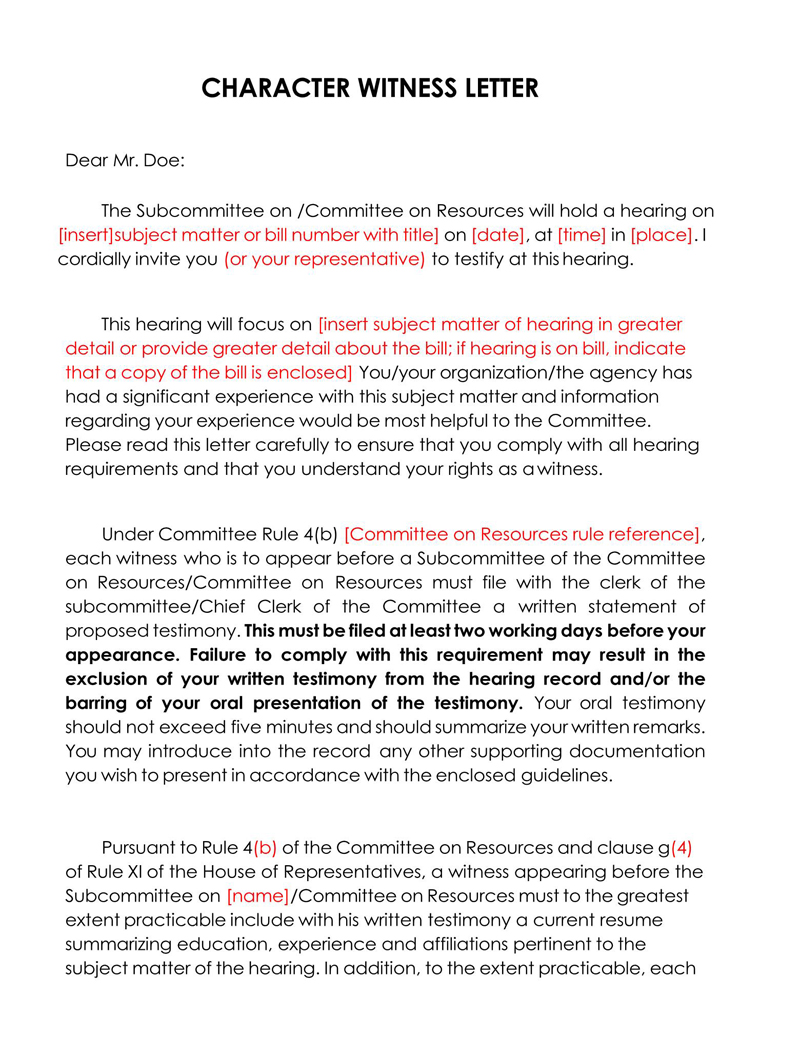
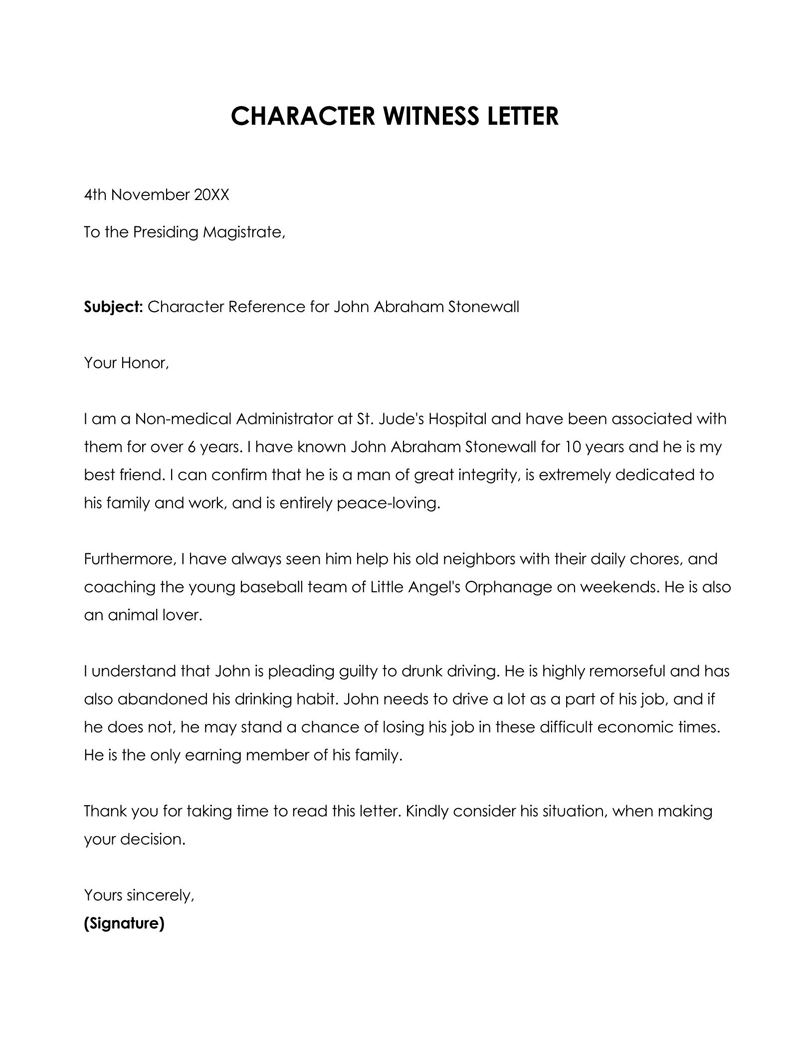
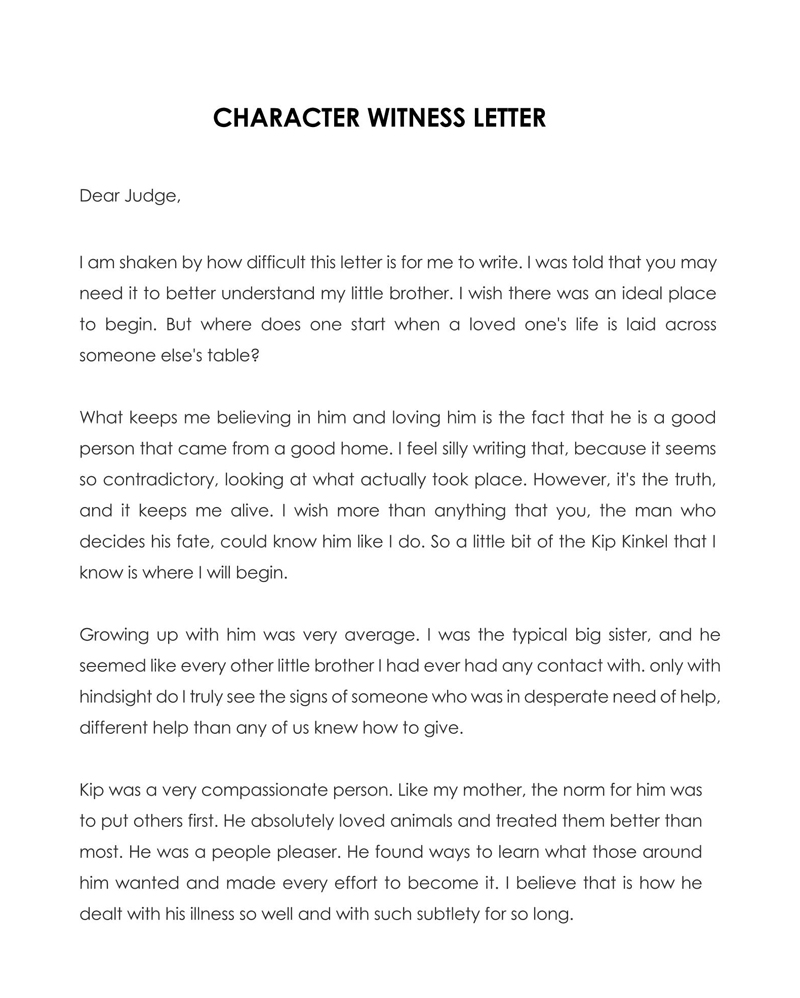
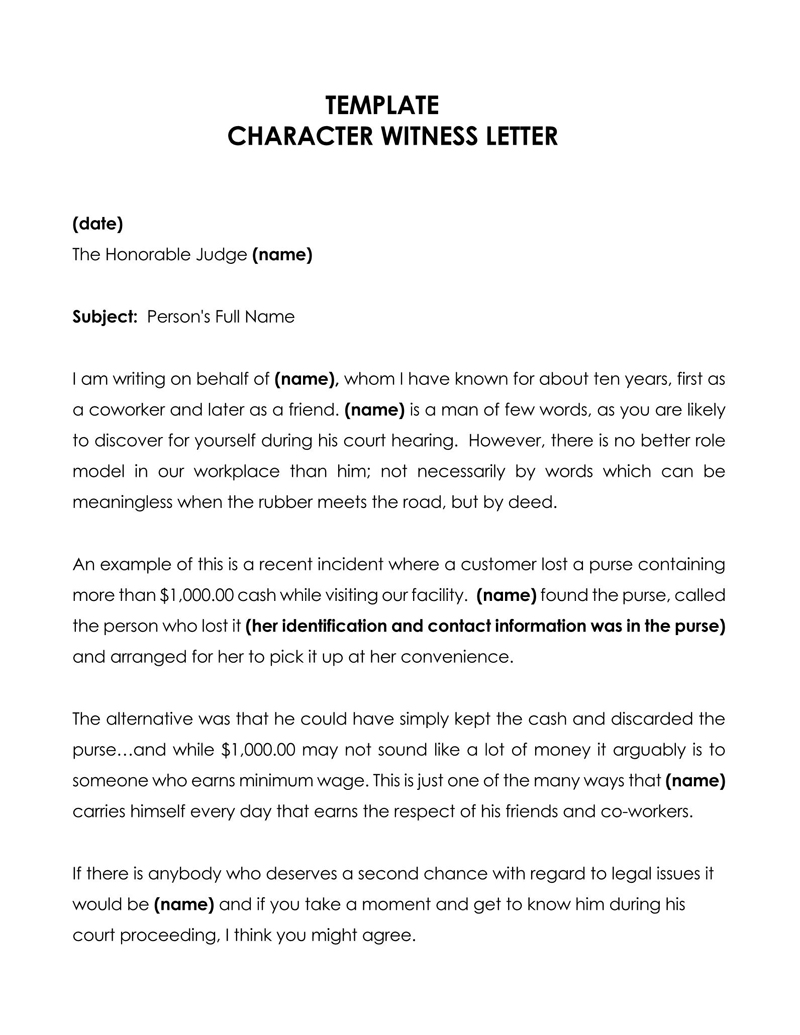
What is a Character Witness Letter?
It is a document that is often used in judicial cases to demonstrate a defendant’s personality, morals, and reputation.
It is written by a person who is well acquainted with the defendant. The letter is often used in child custody cases, drunk driving occurrences, or severe criminal cases where it is requested.
Purpose of using it
Writing the letter aims to help provide information to the judge that the defendant may not be able to. It ensures that the court has a vivid picture of who the defendant is. The letter also aims to support other legal processes, like parole and immigration.
If you are a requester
The defendant in the crime should take time to select a suitable advocate for the character witness letter. The best referee will stem from the defendant’s personal and professional life. Individuals in the accused person’s social network who are willing to donate their time to advocate on the defendant’s behalf should be among the first. The defendant should also ensure that those highlighted in the list are willing to see the process through to the end, as it can be stressful and exhausting, especially when dealing with serious charges.
Individuals with respectable occupations like teachers, school administrators, and religious leaders are among the most suitable candidates to be selected. However, family and friends do not always make the best candidates, as they are perceived to be biased witnesses.
Who can act as a referee?
When selecting a referee, the accused should consider several factors. The first important factor is how long the defendant has known an individual. The longer the accused has known the referee, the better.
Secondly, the accused should also consider selecting a person whose opinions are likely to be respected by the court. The individual’s career can help determine if the person is respectable or not. For instance, teachers are considered respectable members of society. Finally, the accused should consider the charges brought before the court.
For instance, in a DUI case, it is best to select an employer or close family member who will be able to explain why the defendant is important to them and how they would be affected if the court decides to send the accused to jail or suspend their license. On the other hand, in a child custody case, it is best to select an individual who has witnessed the kind of relationship the defendant has with the child.
If you are a writer
A person who is well acquainted with the accused person can be selected to write the character witness letter. The information provided by the selected or appointed writer may impact the type of sentence the accused will receive. The information may also help ensure that the defendant receives a reduced sentence. Details indicated by the writer help ensure that the judge also includes the reference provided rather than simply relying on the facts presented and observed about the defendant’s crime.
Information to be Included
The writer of the letter should indicate relevant information to the court. Therefore, the writer must understand what should be included in the letter.
The following should be contained in a character witness letter:
Recipient’s information
The writer should begin by indicating the date of writing. The recipient’s information should then be provided. The information should include the designated judge’s name, the name of the courthouse, the title of the recipient, and the court’s address.
Greeting
Secondly, a greeting that addresses the recipient directly should be indicated. The recipient’s name can be obtained from the defendant’s lawyer. The writer should ensure that the recipient is addressed appropriately, for example, ‘Dear Judge Smith’ rather than ‘Dear Mr.’ Smith.’
Introduce yourself
Thirdly, an introduction explaining who the writer is should be indicated. It should contain information on the writer’s name and profession. A statement indicating the purpose of writing the letter should also be provided. The name of the individual for whom the letter is intended should be indicated in the statement. The writer should also acknowledge the charges. Such an acknowledgment shows that regardless of the accused person’s situation, the writer is still willing to write the character witness letter.
History/relation with the defendant
Next, information on how the writer and the defendant know each other should be provided. The writer should be specific about the nature of the relationship shared with the accused. For example, the writer may be a family member, close friend, or coworker of the accused.
Details on how the writer and defendant first met and how long they have known each other should be clearly outlined. These details will help build the court’s trust in what the writer has to say in the letter. The writer should also indicate how often they communicate with the defendant to help show that they are well acquainted.
Acknowledge their charges
The writer should continue by acknowledging the charges against the accused. If the accused has expressed how they’re feeling about the charges, then the writer should indicate this in the letter. The accused may express distress, remorse, regret, and a desire to seek help through psychological rehabilitation programs and treatments. It helps show that the writer is aware of the defendant’s condition. The writer may also indicate any issues that may have caused the accused to commit the offense that the writer is aware of, like mental health, illness, and poverty.
State your opinion of the defendant’s general character
An honest statement expressing the writer’s opinion about the defendant’s general character should then be indicated. The writer should also provide examples of favorable aspects observed by the defendant, like generosity, selflessness, integrity, or remarkable achievements. Statements suggesting the type of sentencing to be imposed should be avoided, as that decision can only be made by the court.
Supporting information
The writer should also provide supporting information, such as things the defendant is doing to become a better person. This may also include programs that the defendant has joined to change the bad habit that landed them in court. Such supporting statements help show that the defendant is capable of change.
Conclusion
The letter should conclude with a statement highlighting the impact of incarceration on the defended friends, family, career, and future. It should also contain a statement that indicates the writer’s belief that the defendant has learned a valuable lesson from experience. The writer’s contact information should then be indicated alongside an offer to answer any judge’s questions.
Sign off
The letter should end with an appropriate phrase or word, such as ‘Sincerely’ or ‘Kind regard.’ A hard copy letter should contain a signature above the writer’s printed name.
Character Witness Letter Template
[Your Full Name]
[Your Address]
[City, State, Zip Code]
[Email Address]
[Phone Number]
[Date]
[Recipient’s Full Name or Court’s Name]
[Recipient’s Title or Court’s Address]
[City, State, Zip Code]
Subject: Character Witness Letter for [Name of the Person]
Dear [Recipient’s Full Name or Judge/Panel],
I am writing to you in support of [Name of the Person], who is currently facing [brief description of the legal situation, e.g., “charges related to…,” “a custody battle,” etc.], and to offer a character witness statement on their behalf. My name is [Your Full Name], and I have known [Name of the Person] for [number of years/months] as [describe your relationship, e.g., “a close friend,” “a colleague,” “a neighbor,” etc.]. It is with a deep sense of responsibility and conviction that I share my insights into [his/her/their] character, hoping it will be of value to your considerations.
Throughout the time I have known [Name of the Person], [he/she/they] has consistently displayed qualities of integrity, responsibility, and kindness. [Provide specific examples, e.g., “On numerous occasions, [Name] has volunteered at local community centers, demonstrating a genuine commitment to the welfare of others.”] These instances exemplify [his/her/their] altruistic nature and dedication to positive societal contributions.
In a professional context, [Name of the Person] has shown exceptional dedication and work ethic. [He/She/They] is known among peers and supervisors for [his/her/their] reliability and professionalism. [Offer a specific example, e.g., “During a critical project at work, [Name] took the lead in ensuring deadlines were met, often going above and beyond the call of duty.”]
On a personal level, [Name of the Person] is a compassionate and loyal individual. [He/She/They] values relationships deeply and goes to great lengths to support friends and family in times of need. [Provide an example, e.g., “[Name] has been a pillar of support for [his/her/their] family during difficult times, always providing emotional and practical support.”]
Based on my experiences and the qualities I have witnessed in [Name of the Person], I firmly believe that [his/her/their] character is of the highest caliber. [He/She/They] has shown time and again an unwavering commitment to doing what is right and just, even in challenging situations. It is my sincere hope that my letter offers a comprehensive view of [Name’s] character and that it will be considered favorably in your deliberations.
Please feel free to contact me at [your phone number] or [your email address] should you require any further information or clarification regarding this letter.
Thank you for considering my testimony.
Sincerely,
[Your Full Name]
Character Witness Letter Sample
Dear Judge Smith,
I am writing to you regarding Michael Johnson, who is currently before your court concerning a traffic violation. Having known Michael for over 10 years, I feel both privileged and compelled to vouch for his character and integrity during this challenging time.
Michael and I first met in college back in 20XX, and since then, our paths have crossed both professionally and personally. Throughout this time, Michael has consistently demonstrated qualities that speak volumes about his character, notably his honesty, responsibility, and genuine concern for others.
One of the traits that stands out most about Michael is his unwavering commitment to community service. He has volunteered countless hours at the local food bank every month without fail. I recall a particularly cold December, when Michael organized a charity drive to ensure that those less fortunate would have warm clothing and food for the holidays. This initiative not only helped hundreds of people but also inspired others to contribute. This example underscores Michael’s compassion and dedication to making a positive impact in the community.
Moreover, Michael has always displayed exceptional professionalism and ethics in his role as a project manager at ABC Corporation. He once led a critical project under a very tight deadline, demonstrating remarkable leadership and resilience. Despite the pressure, the project was delivered on time and exceeded client expectations, showcasing Michael’s ability to perform exceptionally well under stress and his commitment to excellence.
Given Michael’s upcoming court date, I sincerely believe that the incident in question is not reflective of his character. Michael is a person who consistently acts with integrity and thoughtfulness. It is without hesitation that I support Michael and recommend leniency in your judgment.
Should you require any further information or wish to discuss Michael’s character and qualifications in more detail, please do not hesitate to contact me at 555-123-4567 or john.doe@email.com.
Thank you for considering my letter on behalf of Michael Johnson. I am confident that any consideration you extend to him will be well justified.
Sincerely,
John Doe
Analysis
The sample letter regarding an individual’s traffic violation effectively advocates for leniency by emphasizing the individual’s character, integrity, and contributions to the community. The writer establishes credibility by citing a long-term relationship with the individual, spanning over a decade, both personally and professionally. By attesting to the individual’s qualities of honesty, responsibility, and concern for others, the writer lays the groundwork for a favorable view of the individual.
Concrete examples of the individual’s positive traits are provided, such as their consistent commitment to community service and their exceptional performance in professional roles. By recounting instances of the individual’s initiative in organizing charity events and their success in delivering critical projects under pressure, the writer illustrates the individual’s compassion, leadership, and ability to thrive in challenging situations.
Furthermore, the writer asserts their belief that the incident in question does not reflect the individual’s true character, emphasizing their consistent behavior of acting with integrity and thoughtfulness. This assertion encourages Judge Smith to consider the broader context of the individual’s life and character when making a judgment.
The writer offers availability for further discussion or information if needed, demonstrating a willingness to support the individual’s case in any way possible. The letter concludes with a polite expression of gratitude for the judge’s consideration, leaving a positive impression and reinforcing the sincerity of the writer’s plea on behalf of the individual.
Effective Tips
A few practices should be considered when writing a character witness letter. These practices will help improve the quality of the writer’s letter. They will also help ensure that the letter communicates its message more effectively.
The practices include the following:
Follow the business letter format
The letter is an official document that should be written using the standard business letter format. It helps convey the writer’s professionalism, which can work in the defendant’s favor. The business letter format also ensures that details are indicated on one page, making the letter a quick read for the judge.
Stay neutral
The aim of the writer’s letter should be to testify about the defendant’s personality and reputation. Therefore, the letter should focus on the defendant and not the charges. At most, the writer should only mention the charges to acknowledge the defendant’s crime or situation.
The tone of the letter
The tone of the letter should be formal and honest, as it touches on serious issues. It helps gain the judge’s trust. It also makes the contents of the letter more genuine.
Proofread and edit
The writer should proofread the letter upon completion to ensure that it is free of spelling and grammatical errors. Proofreading helps ensure there are no confusing or unclear statements in the letter. It also ensures that the letter is polished to high standards.
Conclusion
A character witness letter enables a referee to testify to an accused person’s personality, morals, and reputation. The details indicated in the letter can help compel the judge to reduce the defense sentence or determine what sentence to impose. The writer of the letter should be a respectable person in the defendant’s personal and professional life, like a teacher, employer, or religious leader.
The letter’s writer must ensure it contains information on the history shared with the defendant and an opinion on the defendant’s character. Examples that positively portray the defendant should also be used to help make the letter more impactful. A formal tone should be used in the writing process to help demonstrate professionalism. The writer of the letter should consider using a template and reviewing samples to help ease the writing process.







